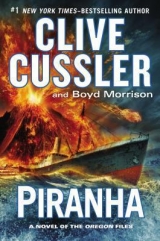
Текст книги "Piranha"
Автор книги: Clive Cussler
Жанр:
Политические детективы
сообщить о нарушении
Текущая страница: 18 (всего у книги 25 страниц)
His men carried scuba gear onto the sub’s pontoons. They would be staying on the deck during the underwater cruise to tip the barrels over the side when it was hovering over the wreckage of the Roraima. All of them had the latest bone conduction headphones that could receive their vocalizations even with masks and regulators on. The transmissions were sent ultrasonically through the water to headsets attached to the straps of their masks.
“Bring me Batiste,” Pasquet said to one of the men.
Pasquet showed him the barrel and the contents inside.
“This dynamite will be inside the sub with you and your son.” Pasquet held up a device that he clamped to the submarine’s hull with a magnet. “This is an acoustic transceiver that uses the metal as a speaker. I will remain outside on the sub’s pontoon broadcasting my instructions to you as you pilot the sub. If you deviate from my directions in any way, we will simply swim away and set off the explosives. Do you understand?”
Batiste nodded numbly, and was taken back to the cockpit. Pasquet closed the barrel.
In reality, Pasquet had no way to remotely detonate the explosives once they were submerged. Radio waves couldn’t travel underwater and he had no other way of broadcasting to the detonators, making the risk of a synchronized timer necessary. The barrels would be dumped all over the shipwreck, with the resulting simultaneous explosions reducing it to a jumble of steel that would take weeks to dig through and destroying any evidence of the Sentinel project that might lay within.
After all the barrels had been scattered on the Roraima, Pasquet would have Batiste settle the sub on the bottom. Pasquet had a small explosive charge that he’d stick to a window, blowing it out. The crew of the Oregon would attempt to rescue the drowning hostages while he and his men swam away. The barrel inside the sub would then explode a few minutes later along with the others, ripping the sub apart. It would be a perfect distraction for their getaway.
A tour bus stopped next to the truck. Pasquet smiled. Just who he was waiting for. Two hostages certainly wouldn’t be enough if the crew of the Oregon decided to turn their weaponry on him and his men. Although the people of the Corporation called themselves mercenaries, Pasquet knew they wouldn’t harm civilians, which made his job that much easier.
He went outside to watch twenty tourists pile off the bus. The tour guide got out of the driver’s seat and Pasquet waved him over.
“Where’s Captain Batiste?” the guide asked.
“He’s inside the sub getting everything ready,” Pasquet replied with a grin. “We have a very special trip in store for you and your guests today.”
Pasquet mentally calculated how long it would take to tie up and blindfold the tourists and then motor out to the wreck. He didn’t want to leave much slack time after they dumped the barrels. He thought now should be about right to start the timer sequence.
He clicked the button in his pocket. Simultaneously, the bombs in all twenty barrels began their countdown. Sixty minutes to detonation.

Berlin
It was only a few weeks to the official start of spring, but Germany’s winter wasn’t giving up easily. Three inches of fluffy snow coated the Berlin streets, and thick flakes continued to fall. The flight into Tegel Airport on the northwest side of the city had been bumpy, but Tiny Gunderson had put the Corporation’s Gulfstream on the runway without a hitch. He planned to get some sleep in the cabin while Juan and Eric made their excursion to the Humboldt University of Berlin.
Juan got the last four-wheel drive on the rental lot, an Audi station wagon that had so far acquitted itself admirably. Only the highways had been scoured by snowplows’ blades, leaving the thoroughfares and side streets caked and rutted. Buses and two-wheel-drive sedans were slowed to a crawl, but the trams that plied the city streets on rails moved easily, unhindered by the snowfall.
Now that they had arrived at their destination, Eric had to risk doing an online search of the library’s catalog to find out if Lutzen’s doctoral thesis was still at the university’s main campus or in one of its multiple libraries located around the city. It would have been a long flight for nothing if the dissertation had been trashed, or destroyed during World War II bombing campaigns, or never filed with the library in the first place.
While Eric checked the library’s database, Juan performed a series of quick turns through Berlin’s streets to make sure they weren’t being followed. Although they’d taken every precaution to prevent Lawrence Kensit from knowing where they were going, Juan couldn’t help feeling that they were missing something, a piece of the puzzle that made it possible for Kensit to track their movements.
Max’s information about Hector Bazin only confirmed that Kensit was willing to go to any lengths to keep his plans secret. To have a mercenary as skilled and brutal as Bazin at his beck and call wouldn’t have come cheap, and bombing an office in Midtown Manhattan was a big risk.
“I got a hit,” Eric said. “Gunther Lutzen. Real person. Physics doctoral student. Filed his thesis in 1901.”
“Tell me it’s still in the library,” Juan said. “Tiny’s going to be unhappy if we come back empty-handed.”
“The dissertation is on file, but it’s so old that it hasn’t been digitized so we’ll have to see it in person.”
Juan nodded, happy that they’d flown to Berlin. If they’d done their search online, hoping to read the thesis back in New York, they might have tipped Kensit off about their intentions. “Where do we find it?”
“It’s in the special collections at the Jacob and Wilhelm Grimm Center.”
“A library named after the Brothers Grimm? How appropriate. Let’s hope this fairy tale has a happier ending.”
“It’s a new building in central Berlin. They moved all of their natural sciences books to a different library, but most of the old theses and rare documents are at the Grimm Center. Lucky for us, it’s only about ten minutes from here. I’ve got the route mapped out.”
“Can we check the thesis out?”
“No. Because it’s so old, it can be examined only at the library. Besides, we don’t have a library card.”
Satisfied that they didn’t have a tail, Juan followed Eric’s directions.
“What is Lutzen’s thesis called?” Juan asked.
“I plugged it into my phone’s translator, but I don’t know how good it is with scientific terminology. We should get a more definitive translation when we’re back on the Oregon.”
“Spitballing is fine for now.”
Eric furrowed his brow at the screen. “It says ‘On the detection and perception of minor atom particles and radioactive decay.’”
“What are ‘minor atom particles’?”
“I don’t know. The abstract isn’t online, if they even wrote abstracts back then. It could mean subatomic particles.”
“It doesn’t give us much to go on. Why would Kensit be so desperate to keep it secret?”
“When I was in college, I studied that era of physics experimentation, and it really was an exciting period in the science.” Eric became animated as he talked about it. “In the span of ten years, from 1895 to 1905, some of the most critical discoveries and hypotheses in scientific history were made. In 1895, Wilhelm Röntgen discovered X-rays. The next year, Henri Becquerel and Marie Curie found that certain chemical elements gave off rays that fogged unexposed photographic plates and called the phenomenon radioactivity. In 1897, J. J. Thomson discovered electrons. Ernest Rutherford built on their work in 1899 and determined that uranium gave off alpha and beta rays. And on and on until 1905, when a Swiss patent clerk published his special theory of relativity.”
“I didn’t know Einstein was Swiss.”
“He was a draft dodger. He moved there from Germany to avoid Army service. Kind of ironic, now that he’s considered one of the fathers of the atomic bomb.”
“Where does Gunther Lutzen fit in?”
“At the time, Berlin University was one of the premier centers for theoretical nuclear physics and quantum mechanics. Max Planck was one of the first physicists to accept Einstein’s theory, which was surprisingly controversial back then. Planck, who subsequently won the Nobel Prize in physics, was also a professor at the university. If Lutzen got his doctorate there, he was among some of the giants in the field.”
“If Lutzen’s work was so groundbreaking, why haven’t we heard of him?”
Eric shrugged. “I just did a quick search of the physics literature. He never published, and his work was never referenced in anyone else’s papers. If the work doesn’t show up in a peer-reviewed journal, it essentially doesn’t exist. Lutzen may have been preparing his findings for a paper when he died. That could be the journal that Kensit found. It’s also possible that his work was too groundbreaking.”
“‘Too groundbreaking’?”
“It’s possible Lutzen’s ideas were so novel that he had trouble getting his work published. Enrico Fermi, one of the scientists on the Manhattan Project, submitted a paper to the journal Nature in 1934, explaining the structure of the atom as we know it today, and it was rejected for being ‘too remote from reality.’ If Lutzen’s work was that far ahead of its time, he may have been trying to find more evidence to support it.”
“In the Caribbean?”
“We won’t know what he was looking for until I can see the thesis.”
“We’ll need just a couple of minutes with it,” Juan said. He still had his camera glasses with him. When they reached the library, they’d request the thesis, which would be brought to their carousel. Juan would flip through each page to get a high-resolution image of the entire document and then transmit it back to Overholt for a complete translation by the CIA.
Juan found a parking space on the street in front of the Grimm Center, a gray concrete building that was all right angles and which had narrow slits for windows. Given the austere façade, he thought the name Grimm was fitting in more ways than one.
He and Eric hustled inside, brushing away snowflakes as they approached the main desk. They were directed to a librarian on the sixth floor who could help them with the special collections.
Their path took them through the building’s central atrium, and Juan was momentarily taken aback. Unlike the center’s cold and uninviting exterior, the atrium was a stunning architectural statement brimming with warmth and light. From the atrium’s ground floor, terraced balconies of reading stations with forest green tables climbed to the sixth floor. The walls were clad in rich wood, and a grid of skylights provided much of the illumination. Thick carpeting muffled any rustling of paper or whispered conversations.
When they got to the librarian’s station, a ponytailed student wearing a name tag reading “Greta” said something in German. Though Juan was fluent in Spanish, Russian, and Arabic, his German was minimal.
“I don’t suppose you speak English,” he said.
“English, yes,” she said with a smile and a heavy accent. “A little.”
“We would like to look at a thesis from 1901 by a student named Gunther Lutzen.” Eric showed her the title of the thesis.
Greta furrowed her brow, then looked up at Juan. “You also want this document?”
Juan’s muscles tightened. “What do you mean ‘also’?”
“A man has come minutes ago to see it. The librarian, Herr Schmidt, has just taken him there.”
“What did this man look like?”
“He is . . . oh, how do you say . . . schwarz?” She rubbed the skin of her arm and pointed at a black stapler.
“He has dark skin?” Juan said.
Greta nodded. “Ja. Very dark.”
Bazin. He had anticipated their move yet again despite all of Juan’s precautions. If he got the thesis and destroyed it, they might lose their last link between Gunther Lutzen and Lawrence Kensit.
“Where did they go?”
“To the archives on this level,” she said, confused at Juan’s sudden urgency. “It’s there.” She pointed toward the other end of the building.
Juan and Eric took off running down the hall. When they were alone, Juan stopped and pulled up his pant leg to access the hidden panel in his combat leg. He drew the .45 ACP Colt Defender and closed the leg back up. He hid the gun under his jacket. Eric wasn’t armed, but he didn’t have much use for a weapon since he wasn’t trained for combat. Juan considered sending Eric for library security, but they would be unarmed. The police would be better, but this would be over by the time they arrived.
Still, Eric couldn’t come with him empty-handed. Juan removed the C-4 pack, detonator cap, and activation switch and shoved them into Eric’s hands.
“What should I do with these?” Eric asked.
“Not sure. You’ll think of something. Stay behind me.”
They continued on to a door marked “Archiv.” Juan eased it open, the oiled hinges making no sound. He crouched and pushed his way inside with his eye on the Colt’s iron sight. He swept the long room, which was filled with stacks of bound theses and rare books.
He crept along the row of shelves until he reached the end while Eric went the other direction. Juan swiveled around and saw Bazin behind a tall, thin man who had to be Schmidt. Juan would have had no compunction about shooting a murderer like Bazin without warning, but he was almost completely hidden by Schmidt, who had his back to Juan with his arms raised.
Bazin had a gun on Schmidt. The thesis was in Bazin’s other hand.
Juan didn’t have time to get a different angle on him.
“Let him go, Bazin!” he yelled, his pistol ready to fire.
Bazin pressed his gun to the bespectacled man’s temple, making sure to keep the terrified librarian between him and Juan. Bazin’s face was completely obscured behind Schmidt’s head. Even with the Colt’s Crimson Trace laser sight, Juan had no shot. The elbow of Bazin’s arm made a motion that looked like he was tucking the thesis in his coat.
No one else seemed to be in the archives with them.
“You’re quicker to get here than I expected, Cabrillo,” Bazin said with a French accent as he edged toward a door on the opposite side of the room.
“How did you know I’d be here?”
“Ah, that is the question, isn’t it?” Bazin inched closer to the door.
“You couldn’t have tapped our communications to find out.”
“It’s definitely a puzzle. That was clever with the glasses, to get my identity.”
Juan kept his aim on Bazin, ready for any mistake by him. Eric was poised in the next row with the C-4 and detonator, but Juan subtly shook his head to back off.
“You must realize you’ll never make it out of Germany,” Juan said.
“I’m not worried.”
“What does worry you?”
Bazin was next to the door. “Nothing much, when you have the advantages I have.”
“I know you work for Lawrence Kensit.”
“And without this thesis, that’s all you will know.”
There was a polished metal plate beside the door with the name of the department in the next room. Juan could make out Bazin’s face in the reflection. “Bazin, I see you.”
Bazin looked at him in the mirrored finish. “You’ll have to shoot him to get me.”
“Not what I had in mind.” Juan shifted the Colt’s sight to the metal sign. He waited until Bazin eyed him with a sneer, then triggered the laser.
Bazin cried out as the powerful beam blinded him and he let go of Schmidt, who ran toward Juan in a panic. There was no way to fire again safely until he was out of the way.
“Down!” Juan shouted. Schmidt tripped over his own feet and went sprawling, bashing his head against a metal shelf. Juan had his first clear field of fire at Bazin, who was still blinking away the dazzling effect of the laser.
The door to the hall flung open and another Haitian charged in, dual pistols blazing. The clever Bazin had been stalling, waiting for his man to arrive and outflank Juan. Juan didn’t have time for more than a couple of wild shots as he dived for cover.
At the same time, the C-4 sailed over the shelf and landed on the floor next to the dual-wielding gunman. He looked with curiosity at the device before it detonated.
The blast hurled him like a rag doll against a shelf, knocking it over and causing a domino effect of tumbling shelves.
Bazin took advantage of the distraction and darted through the door next to him.
“Eric!” Juan yelled. “Are you all right?”
“I’m okay. Just buried under some books.”
Juan pulled the dazed Schmidt to his feet and pointed at Eric. “Help him.” Schmidt nodded, and Juan dashed through the hallway door in pursuit of Bazin.
As soon as he got outside, he saw Bazin running around the corner. When he saw Juan, he changed course and shot out the glass window into the central atrium. He jumped through and onto a table, past the students who were already rushing toward the exits in response to the blast and gunshots.
Juan chased after him. The masses of students in the background prevented him from taking a shot at Bazin, who vaulted down the terraces.
Juan was one terrace behind. Their jumps down to the next level were synchronized. When he reached the bottom, Bazin avoided the main entrance where the students were streaming out and instead crashed through an emergency exit.
Juan burst through the door seconds later to find near-blizzard conditions. Wind howled, and the icy flakes needled his exposed skin. The only good thing about the weather was that he could tell exactly where Bazin had gone.
Juan sprinted after the fresh pair of footprints.

Martinique
Max kept track of the recovery process from his engineering station in the op center. According to the latest reports from the divers on the Roraima, shoring up the collapsed steel girders was complete and they were beginning to dig through the debris where they’d gotten the radiation readings and found the camera lens. Eddie and Linc were about to go down for their second dive and join the search. If any photo tins were left intact down there, they should be relatively near the surface since the passenger cabins had been at the top of the ship.
“Max,” Mark Murphy said with uncharacteristic alarm, “you better get over here and see this.”
“Are the radiation readings spiking?” Max asked as he went over.
“Worse. I just got an email.”
“From who?”
“That’s problem number one. I don’t know.”
When Max reached Murph’s station, he immediately saw the second problem. The email contained two photo attachments. The first was a picture of the interior of a tourist submarine with two rows of people, sitting back to back, with their wrists bound behind them and blindfolded. In the background was a plastic shipping barrel. The second photo showed what was in the barrel. It was enough dynamite to blast the sub to bits.
The message had only one line: Stay away or they all die.
Max frowned at the screen. “You don’t know how you got this?”
Murph threw his hands in the air, flummoxed. “This is my private Corporation account. Nobody but the people on this ship should have the email address.”
The breach was further confirmation that their security had been compromised.
“What does he mean ‘stay away’?” Murph said.
Max turned to Linda. “Show me the harbor.”
The main screen displayed the feed from one of the deck cameras. It panned left to right until Max spotted an odd white vessel in the distance moving slowly toward them.
“Zoom in.”
Linda magnified the image until they could see a high-definition shot of a submarine that had catamaran pontoons on either side plowing through the rough seas. Armed men in wetsuits and scuba gear braced themselves on both pontoons amid dozens of barrels like the one in the email. Each of them had to have been filled with explosives.
“They’re going to blow up the Roraima,” Linda said.
“I’m getting really sick of Kensit knowing what we’re doing and where we’ll be,” Murph said.
Max agreed. “This took some planning. They didn’t just throw together dynamite and a sub hijacking at the last minute. They’ve known we were coming here as long as we have.”
“Which means Kensit knows what we’re looking for,” Murph said. “Destroying the Roraima is the only way to keep us from finding it.”
“He must also know at least some of our capabilities. That’s why his men brought the hostages. They realized we would have torpedoed them the instant we knew it was them.”
“We can’t let them destroy the ship,” Murph said. “We’ll never find Kensit if that happens.”
“What are our tactical options?”
“Offensive weapons are off the table with hostages inside.”
“And we can’t send divers to attack,” Linda said. “Even with the rough seas, they’ll be spotted long before they could sneak up on the sub. They’d kill everyone on board before we got within a hundred feet.”
“They’ll probably kill everyone anyway,” Murph replied. Given what Max had seen about Kensit and Bazin’s operations, he had no doubt the hostages were in grave danger no matter what they did.
“We have to do something,” Murph said.
“What if we—” Max said and then stopped himself. He suddenly had an idea that might work, but if anyone really was listening in on their conversations, he’d have to risk putting it into play without conferring with anyone else.
“What if we what?” Murph asked.
Max shook his head as if he was frustrated with himself. “Nothing. It’s too crazy. We need to back off.”
“And just let them erase the evidence we’re looking for?”
“We don’t have a choice,” Max said, hoping he sounded convincing. He called down to the moon pool. “Get me Eddie.”
When Eddie was on the line, Max said, “We’ve got company coming, half a dozen hostiles on the outside of a sub carrying barrels of explosives.”
“But we’ve got five men down at the Roraima, digging through it. They’re about to come up for their decompression stops.”
“I know. There are hostages inside the sub, so we need to make sure they’re not harmed. I want you and Linc to take SPPs down with you just as a precaution.”
Eddie sounded confused. “As a precaution?”
“I’m sorry but I can’t explain right now. When you get down there, send your people up and you two hunker down inside the PUH.” Max hoped that the portable underwater habitat would provide a safe haven for Eddie and Linc. “Wait for my signal that the hostages are no longer in danger. You’ll know it when you hear it. You’ve only got about ten minutes before the sub gets here, so hurry.”
“Roger that.” He hung up.
“SPPs?” Murph said. “But you said—”
Max interrupted Murph before he could blurt out anything more. “I need you to trust me.” He addressed everyone in the op center. “We are not going to let those hostages be killed. Do you understand?”
They all nodded, but Max could tell they were confused.
They did trust him, however. That’s why no one asked why he had sent Eddie and Linc down with SPP-1 underwater pistols that fired deadly steel darts, firearms specially designed for Soviet-era Special Forces and acquired by the Corporation.
The crew knew Max was sending his men into battle.








